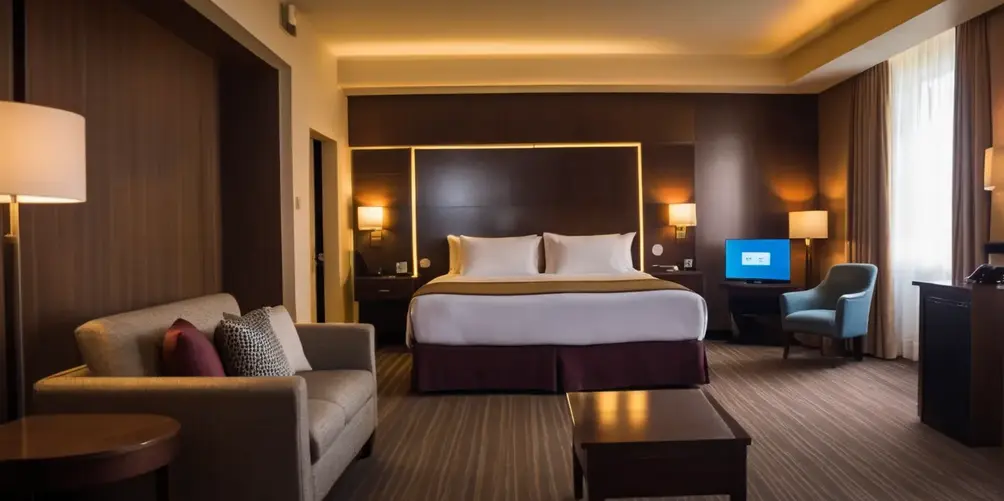In today’s digital world, fast and reliable Wi-Fi is no longer just an amenity that’s “nice to have” at hotels – it’s an absolute necessity. Guests expect to stream movies, work remotely, and video chat with ease during their stays.
For hotels, providing a robust Wi-Fi network is critical, but managing it in-house can be challenging. This is where managed Wi-Fi services come in. Read on to learn the key benefits of managed Wi-Fi and the best practices for implementing it at your hotel.
Understanding Managed Wi-Fi and How It Works
With managed Wi-Fi, you partner with an experienced third-party provider to install, monitor, and manage your hotel’s entire wireless network. Rather than handling daily Wi-Fi administration like bandwidth allocation, access point configurations, firmware updates and troubleshooting yourself, these tasks are handled by specialists.
Here’s a high-level overview of how managed Wi-Fi works:
Site Survey – The provider first thoroughly surveys your property to map out optimal access point placements and design a customized Wi-Fi system tailored to your hotel’s needs.
Installation & Configuration – The managed provider then installs and configures all necessary hardware including routers, switches, controllers and access points. The network is tested to ensure full property coverage and performance.
24/7 Monitoring & Maintenance – Your network is then continuously monitored and managed remotely by the provider’s experts. Any needed maintenance, upgrades or troubleshooting is handled proactively by the provider.
Reporting & Analytics – Robust reporting provides visibility into network traffic, usage patterns and other key metrics to inform planning.
Onsite Support – For any major onsite service needs, certified technicians can be rapidly dispatched to your property.
Guest Support – Many providers offer dedicated guest support services to help visitors connect and troubleshoot issues.
In short, with managed Wi-Fi, your hotel gets a fully optimized network and the peace of mind of having a dedicated team manage it end-to-end.
Key Benefits of Managed Wi-Fi for Hotels
There are many compelling reasons for hotels to adopt managed Wi-Fi. The key benefits include:
Reduced Operating Costs
With managed services, there are no large capital expenditures for network equipment. Instead, you pay a predictable monthly fee based on the number of access points needed for your property. Unplanned expenses for break-fix and troubleshooting are also minimized since the provider proactively monitors and manages the network.
Improved Reliability
Leading managed Wi-Fi providers offer service level guarantees of 99.999% uptime. The use of enterprise-grade hardware, constant monitoring, and redundant failover capabilities ensures the network is highly reliable. Any issues get rapidly detected and resolved before significantly impacting guests.
Enhanced Security
Regular patching, updating, and 24/7 threat monitoring by dedicated experts enhances security and reduces a hotel’s cyber risk profile. Guest traffic can also be segmented to prevent unauthorized access of internal systems. With the rise of attacks targeting the hospitality industry, managed security is invaluable.
Optimized Guest Experience
With sufficient bandwidth and density designed specifically for the property, guests enjoy fast speeds with no dead zones throughout their stays. The provider’s guest support services also allow visitors to get quick help connecting or troubleshooting issues. This directly improves guest satisfaction.
High Scalability
The network bandwidth and number of access points can be quickly scaled up or down as needs change. Whether accommodating a special event or adjusting for seasonality, managed Wi-Fi provides flexibility.
Simplified IT Management
No need to dedicate precious internal IT resources to daily network administration tasks like managing routers, switches, access points and more. Your team is freed up to focus on key projects.
Valuable Analytics & Insights
Robust reporting provides real-time and historical visibility into network traffic, speeds, usage trends and other intelligence to inform planning. Identify high-demand areas or busy usage times to optimize operations.
Seamless Support
With managed Wi-Fi, support is only a quick call away. Whether hotel staff need guest connectivity assistance or a major issue arises, certified technicians can provide rapid remote or onsite resolution.
Best Practices for Adopting Managed Wi-Fi
 Follow these best practices to ensure your hotel gets maximum value when switching to managed Wi-Fi:
Follow these best practices to ensure your hotel gets maximum value when switching to managed Wi-Fi:
Choose a reputable provider with extensive hospitality experience. Look for a proven track record with hotel clients. Hospitality focused providers understand the unique connectivity needs and challenges.
Get clear on what’s included. Ask detailed questions on items like service level agreements, guest support, integration capabilities and reporting features to set proper expectations.
Ensure sufficient bandwidth. Provide adequate internet bandwidth to handle peak usage times to prevent bottlenecks. Over-provisioning bandwidth is recommended.
Consider long-term goals. Discuss your hotel’s expansion plans and roadmap for rolling out additional technologies. A scalable network design accommodates future needs.
Involve internal stakeholders. Engage leadership, IT teams, and department heads early in the planning process to get buy-in and gather requirements.
Train staff. Ensure staff know who to contact for guest support and basic troubleshooting. Provide front desk staff materials to help guests connect.
Start with a small pilot. Beginning with a limited pilot deployment and testing period allows you to work out any issues before a wider rollout.
The Importance of Site Surveys
One of the most critical components of managed Wi-Fi is the initial site survey conducted by the provider’s engineers. The survey thoroughly evaluates your property’s unique attributes that impact Wi-Fi signal distribution and performance. This includes factors like:
- Building Materials – Structures made from concrete or thick walls attenuate signals. More access points may be required.
- Physical Layout – The placement of walls, elevation changes and size of the property impact coverage.
- Guest Rooms – The quantity and clustering of rooms informs optimal access point placement.
- Public Spaces – Where guests congregate like the lobby, pool, restaurants, etc. influences access point locations.
- Meeting Rooms – Spaces hosting large groups require sufficient bandwidth and coverage.
A heat map showing Wi-Fi signal propagation throughout the property helps identify dead zones and areas of insufficient coverage. This allows access points to be strategically located to provide hotel-wide connectivity. A quality site survey provides the blueprint for designing a high-performance network tailored to your building and usage needs.
Key Differences from Unmanaged Wi-Fi
It’s helpful to contrast managed Wi-Fi with unmanaged networks. With unmanaged Wi-Fi, the hotel purchases and installs its own Wi-Fi equipment. The hotel IT team is then fully responsible for administering every aspect including:
- Choosing and purchasing access points, routers, controllers, switches and licenses
- Configuring SSIDs, passwords, VLANs, subnets, and other network settings
- Installing access points and cabling throughout the property
- Patching firmware and applying security updates
- Monitoring traffic flows and troubleshooting issues
- Adding/repositioning access points when needed
- Ensuring sufficient bandwidth and internet capacity
This is a monumental undertaking requiring significant expertise and resources. Networks grow increasingly complex with the addition of new technologies like IoT devices and mobile solutions. With lean IT staff and budgets, few hotels can effectively handle advanced Wi-Fi administration in-house. This typically leads to subpar network performance, frustrated guests and reactive firefighting by IT teams.
By contrast, managed Wi-Fi cost-effectively provides enterprise-grade Wi-Fi tailored to your environment. The heavy lifting of design, monitoring and management is handled by dedicated experts. Hotels reap the benefits of a robust Wi-Fi environment without taxing limited resources.
Key Capabilities to Look for in a Provider
 When evaluating managed Wi-Fi providers, look for these key capabilities:
When evaluating managed Wi-Fi providers, look for these key capabilities:
- Specialized Hospitality Expertise – Domain expertise optimizing Wi-Fi for hotels is crucial.
- Technical Support Options – Look for 24/7 phone, email and chat support with rapid response times.
- Network Monitoring & Management – Robust real-time and historical visibility into the network is invaluable.
- Enterprise-Grade Equipment – Support for leading brands like Cisco, Aruba and Ruckus provides reliability.
- Integrations – Open APIs support integrations with hotel PMS, guest apps, and other systems.
- Analytics & Reporting – Data insights assist planning and identifying usage trends.
- On-Site Technicians – Local access to certified technicians accelerates issue resolution.
- Guest Support – Dedicated services assisting visitors with connecting devices improves satisfaction.
- Security Capabilities – Advanced security features like segmentation, firewalls, and WPA2 safeguard guests.
- Scalability – The network design should easily accommodate growth and fluctuations in usage.
The optimal managed Wi-Fi partner becomes a true extension of your hotel’s team. Their job is to ensure fast, seamless connectivity powering your guest experiences, staff workflows and systems. Investigating providers thoroughly is well worth the effort.
Drive Guest Satisfaction with Managed Wi-Fi
In the fast-paced hospitality industry, guests expect interconnectivity and bandwidth availability matching their households. Yet scaled Wi-Fi networks require vigilant oversight and expertise. By partnering with a managed Wi-Fi services provider, your hotel gains cost-effective access to enterprise-grade equipment and specialized support. Hotel IT teams are relieved of Wi-Fi administration burdens. Whether you operate a modest-sized property or a multi-tower resort, managed Wi-Fi delivers the fast, reliable connectivity that today’s guests demand. Contact a trusted provider today to evaluate your needs and discuss a managed Wi-Fi solution tailored for your hotel.
